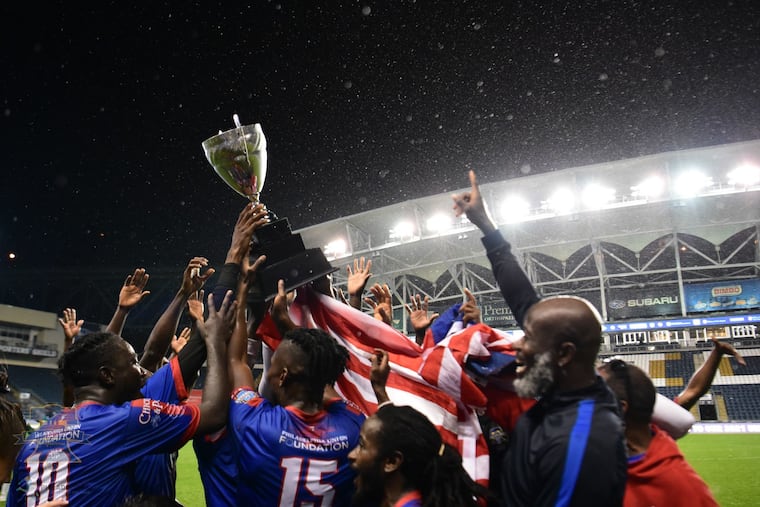Ahead of the Unity Cup Final, soccer means everything to Philly’s Liberian community
The Liberian team will play for its fifth straight Unity Cup title against Team USA Saturday.

When Anthony Allison first came to Philadelphia from Liberia as a 14-year-old, he was scared and intimidated by the unfamiliarity of his new life. But the first day he walked to McCreesh Park in his Southwest Philly neighborhood and saw a group of other Liberian kids playing soccer, he exhaled. Finally, something familiar.
Now, 20 years later, Allison is the captain of the Liberian Unity Cup team, who play for their fifth consecutive title on Saturday night. The Philadelphia International Unity Cup is a World Cup-style tournament played each year since 2016, with teams representing dozens of countries and immigrant communities. After the captain scored a late game-winning goal in this year’s semifinal round, Team Liberia will face off against Team USA at Lincoln Financial Field on Saturday at 6 p.m.
The Liberian’s Unity Cup dominance may be surprising to some, since the small West African nation isn’t much of a player on the international soccer stage, and did not qualify for the upcoming World Cup. But it’s no surprise to Philadelphia’s Liberian community, which is estimated to be as many as 15,000 strong, the largest African immigrant group in the region. To them, soccer is everything.
“[To] make a comparison to the American community, it’s much more than what football means to you guys,” John Rufus Kortue Jr., a coach for the Unity Cup squad, said with a laugh. “When we sit together, it’s hard to encounter a Liberian who hasn’t played soccer before.”
More than just the beautiful game
Kortue was one of many Liberians who fled their home in the 1990s as the country erupted in civil wars. Philly became a popular destination for Liberians, most of whom settled in Southwest Philly.
“So as the population grew, of course there was [more] interest in soccer,” said Konah Mitchell, a mental health counselor who immigrated to Philadelphia in the 1980s, before most other Liberians.
As soccer was for them in Liberia, the sport is common ground to bond. People here obsess over the professional leagues, especially the English Premier League and the Spanish “La Liga.” They play pickup on the weekends, gathering every Saturday, like a “ritual,” according to Mitchell.
“It means everything to be a leader of this special group.”
Afterward, things can evolve into a “therapeutic session,” where those gathered discuss everything from politics to social events, often for hours.
Mitchell was an accomplished player himself, having played for Lincoln University in the ‘90s. He came back to Southwest Philly and helped establish a soccer club named Cavalla FC, so Liberian kids in the neighborhood could have a more formal soccer environment to sharpen their skills.
Mitchell earned the nickname “GM for the Liberian Community,” since he spent so much of his time scouting and recruiting players for the program, including Allison and Kortue. It worked; many of Cavalla’s players went on to play in college and some even professionally, like Allison, who played for six years in Puerto Rico and Sweden.
But Cavalla’s greater impact may have been the sense of community it fostered. “We went way beyond just soccer,” explains Kortue, who coached with Cavalla FC, too. The club would hold tutoring sessions for neighborhood kids, and make sure their everyday needs were being met.
Cavalla was eventually folded into another Liberian founded club, Philadelphia Lone Star FC. Today, Lone Star has a men’s team which competes in a few pre-professional leagues, a women’s team, and a youth academy program.
Even as Lone Star has become the face of Philly’s Liberian soccer community, the emphasis on community care is still strong. Kortue admits that sometimes, it can be burdensome to spend much of his own money on cleats or uniforms for kids in the free Lone Star system. “But, then if you look at the reward, it outweighs the struggles we go through. It puts smiles on the kids’ faces.”
» READ MORE: From cricket to Sepak takraw, Philly’s immigrant communities got game
To him and the other adults involved, it’s an investment. “When I think about 200, 300 dollars here and there that we spend, I think it is worth a kid getting 80, 90 thousand dollars [worth of scholarship money] to get his bachelor’s degree,” he said .
“Cause I don’t want them to experience what we experienced, you know?”
Even still, there’s more work to be done. Those involved with Lone Star and the wider Liberian soccer community recognize that there aren’t enough opportunities for girls and women interested in soccer. Mitchell said it is their “biggest lapse for right now”, and “we can’t make excuses about [the lack of programs].”
‘It brings a joy to our community’
Allison and Kortue expect there to be an enthusiastic crowd of Liberians supporting their team as they step onto the finely manicured grass of the Eagles’ stadium on Saturday night. Even though winning is familiar to them, and the Unity Cup is ultimately a local tournament, they take nothing for granted about soccer and how it feels to be part of Team Liberia.
“It means everything to be a leader of this special group,” saidthe captain. “To do what we’re doing is something you don’t see in sports.”
“It’s always a kid’s dream to represent their homeland. I didn’t get that opportunity because of the civil war,” Kortue said about his own soccer journey. But as he prepares the team for their biggest moment, his motivations are selfless. He wants the team to win for Southwest Philly.
“We’ve had some negativities in our community ... we don’t want those images to represent [us]. And so when we [achieve something], it makes us proud. It brings a joy to our community. So it would be very pleasant to lift the trophy again.”